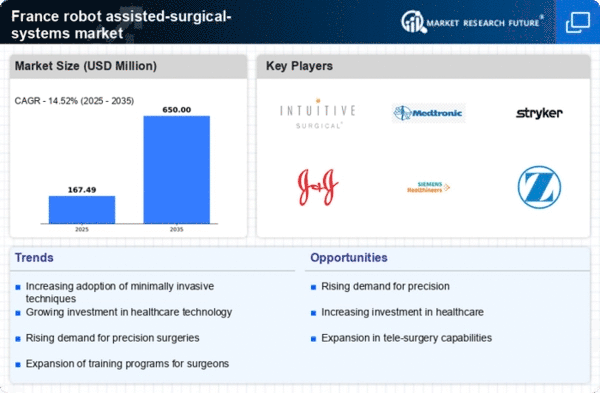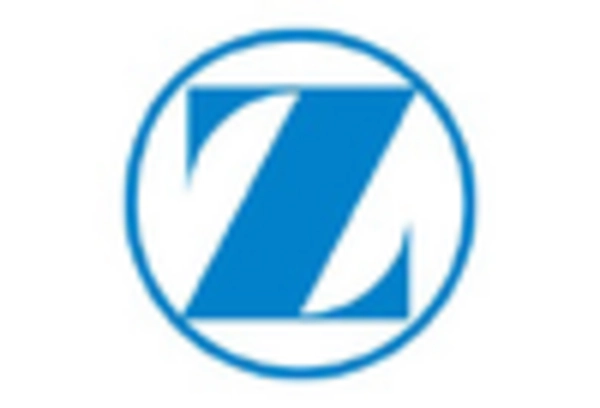Surge in Surgical Procedures
The surge in surgical procedures across various medical specialties is significantly impacting the robot assisted-surgical-systems market. With an increasing population and a growing prevalence of chronic diseases, the demand for surgical interventions is on the rise. In France, the number of surgical procedures performed annually has been estimated to exceed 1 million, with a notable shift towards minimally invasive techniques. This trend is likely to drive the adoption of robotic systems, as they offer enhanced precision and reduced recovery times. Furthermore, the integration of robotic assistance in surgeries such as urology, gynecology, and orthopedics is becoming more commonplace, indicating a robust market potential. As healthcare providers aim to improve patient outcomes and operational efficiency, the robot assisted-surgical-systems market is poised for substantial growth in response to this increasing demand for surgical interventions.
Increasing Healthcare Expenditure
The rising healthcare expenditure in France is a pivotal driver for the robot assisted-surgical-systems market. As the government and private sectors allocate more funds towards healthcare, the demand for advanced surgical technologies is likely to increase. In 2023, healthcare spending in France reached approximately €300 billion, with projections indicating a growth rate of around 4% annually. This financial commitment facilitates the adoption of innovative surgical systems, enhancing patient outcomes and operational efficiency. Hospitals are increasingly investing in robotic systems to improve surgical precision and reduce recovery times, which aligns with the broader trend of enhancing healthcare quality. Consequently, the robot assisted-surgical-systems market is expected to benefit from this upward trajectory in healthcare investment, as more facilities seek to integrate cutting-edge technologies into their surgical practices.
Supportive Regulatory Environment
A supportive regulatory environment is a key driver for the robot assisted-surgical-systems market. In France, regulatory bodies are increasingly recognizing the importance of robotic technologies in enhancing surgical outcomes. The approval processes for new robotic systems have become more streamlined, encouraging manufacturers to innovate and bring advanced solutions to market. Recent initiatives by the French government to promote digital health technologies are likely to further facilitate the adoption of robotic systems in surgical settings. This regulatory support not only fosters innovation but also instills confidence among healthcare providers regarding the safety and efficacy of robotic-assisted surgeries. As a result, the robot assisted-surgical-systems market is expected to thrive in this conducive regulatory landscape, with increased investments and advancements in surgical technologies.
Technological Integration in Healthcare
The integration of advanced technologies in healthcare is a crucial driver for the robot assisted-surgical-systems market. Innovations such as artificial intelligence, machine learning, and enhanced imaging techniques are transforming surgical practices. In France, hospitals are increasingly adopting these technologies to improve surgical precision and patient safety. The market for robotic surgical systems is projected to grow at a CAGR of approximately 10% over the next five years, driven by the need for more efficient and effective surgical solutions. This technological evolution not only enhances the capabilities of surgeons but also aligns with the broader trend of digital transformation in healthcare. As medical institutions continue to invest in state-of-the-art technologies, the robot assisted-surgical-systems market is likely to experience significant advancements and increased adoption rates.
Patient Preference for Advanced Treatments
Patient preference for advanced treatment options is emerging as a significant driver for the robot assisted-surgical-systems market. As patients become more informed about their healthcare choices, there is a growing inclination towards minimally invasive surgical procedures that promise quicker recovery and less postoperative pain. In France, surveys indicate that over 70% of patients express a preference for robotic-assisted surgeries when informed about the benefits. This shift in patient expectations is prompting healthcare providers to adopt robotic systems to meet the demand for advanced surgical options. Additionally, the positive outcomes associated with robotic surgeries, such as reduced hospital stays and lower complication rates, further reinforce this trend. Consequently, the robot assisted-surgical-systems market is likely to expand as healthcare facilities strive to align their offerings with patient preferences.

















